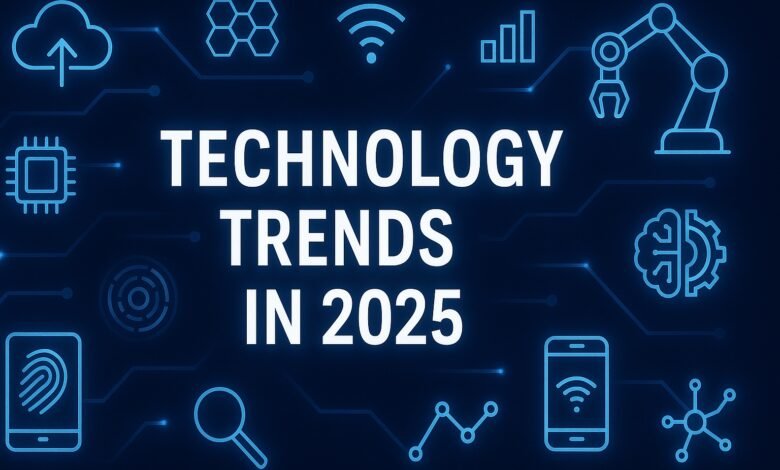Tech You Should Know in 2025: Smarter, Leaner, Faster
Discover top tech trends for 2025—AI, automation, 5G, and cybersecurity—to future-proof your business and gain a competitive edge in a fast-changing world.

The rapid evolution of technology continues to reshape the business landscape. As we approach 2025, it’s crucial for business owners to be aware of the innovations that are not just trends but potential cornerstones for future success. Adopting the right technologies can streamline operations and provide competitive advantages. This blog explores several key technological advancements that you need to know to stay ahead in the business world.
Automation: The Future of Work
Automation is no longer a buzzword; it is a vital component of modern business practice. With advancements in robotics and algorithm-driven software, companies can maximize efficiency and minimize human error. In 2025, automation will become even more integrated, affecting various business functions, from manufacturing to human resources.
The adoption of automation will lead to decreased operational costs and improved productivity. Businesses that implement automated solutions can focus more on strategy and innovation rather than routine tasks. Companies can utilize tools like robotic process automation (RPA) to perform simple tasks, allowing employees to focus on high-value work.
Types of Automation to Consider
- Process Automation: Streamlining repetitive processes through software.
- Data Automation: Using algorithms to manage and analyze large datasets.
- Marketing Automation: Implementing solutions to execute marketing campaigns more efficiently.
When exploring automation options, consider your business’s specific needs. What are the repetitive tasks that consume employee time? By identifying these tasks, you can streamline operations. As a proactive business owner, investing in automation tools will pay off in both time and resources.
Challenges of Automation
Automation is not without its challenges. Resistance to change is a common issue within organizations. Employees may fear that automation will threaten their jobs. Thus, it’s essential to foster a culture of continuous learning and adaptation. Educate your team about the benefits of automation to gain their buy-in.
Moreover, security concerns regarding automated systems are real. Proper implementation requires considering cybersecurity measures. Vulnerabilities can expose sensitive data, which could lead to financial and reputational damage. Therefore, a strategic approach to implementing automation is vital.
Artificial Intelligence: Redefining Business Intelligence
Artificial Intelligence (AI) is rapidly evolving, and its impact on businesses cannot be overstated. In 2025, AI will enhance decision-making processes and revolutionize how organizations operate. Machine learning algorithms will make predictions based on data patterns, which can lead to more informed business strategies.
Integrating AI into your operations can provide personalized customer experiences. Chatbots, powered by natural language processing, can enhance customer support, offering immediate assistance. This level of responsiveness can lead to increased customer satisfaction and loyalty, creating a more robust business model.
AI Hiring Platforms: A Game Changer
As businesses look to optimize their talent acquisition, AI hiring platforms will become crucial. These platforms streamline the recruitment process, helping HR professionals identify the best candidates more efficiently. By analyzing resumes and comparing them with job requirements, AI can speed up the onboarding process significantly.
Using an AI hiring platform can improve diversity in hiring. Algorithms can help mitigate bias by focusing on candidate qualifications rather than irrelevant factors. Business owners looking to build an inclusive workplace should seriously consider integrating such platforms.
Limitations and Ethical Concerns
While AI offers significant benefits, it also presents ethical challenges. Issues such as data privacy, algorithmic bias, and ethical deployment must be addressed. Business owners must be proactive in establishing guidelines that govern how AI should be implemented in their organizations. Ensuring transparency in AI algorithms will help build trust with clients and employees alike.
Moreover, AI cannot entirely replace human intuition. Business owners should view AI as a tool that augments their decision-making rather than a substitute for human oversight. Employing AI responsibly is key to harnessing its full potential without compromising ethical standards.
Cybersecurity: Protecting Your Digital Assets
As technology evolves, so do the threats associated with it. Cybersecurity will be more critical than ever in 2025. Businesses must prioritize safeguarding their data and infrastructure. Breaches not only lead to financial losses but can also erode customer trust. Having strong cybersecurity protocols will be essential for any successful enterprise.
Investing in advanced security solutions is non-negotiable. Cybersecurity tools evolve continuously to counteract new threats. Your company should have a cybersecurity strategy incorporating multiple layers of defense, from firewalls to intrusion detection systems. Regularly auditing your systems will ensure that vulnerabilities are promptly identified and addressed.
The Human Element in Cybersecurity
While technology plays a significant role in cybersecurity, the human element remains paramount. Insider threats can be just as damaging as external attacks. Training employees to recognize potential threats is vital. Conducting regular cybersecurity training will keep your team aware of best practices and emerging threats.
Moreover, having a clear incident response strategy is essential. Should a breach occur, quick action can minimize damage. Ensure that your response plan has specified roles and procedures that employees must follow during a cybersecurity incident.
Emerging Trends in Cybersecurity
Several trends are expected to shape cybersecurity in 2025. One of them is the growing use of artificial intelligence in cybersecurity solutions. AI can analyze vast amounts of data to identify potential threats autonomously, often faster than human analysts. This enhances detection rates and improves response times.
Another trend is the increasing importance of securing personal devices. As remote work becomes commonplace, securing home networks and devices will be essential. Business owners should provide guidelines and resources for employees working off-site to maintain cybersecurity.
Cloud Computing: The Backbone of Business Operations
Cloud computing has changed how businesses operate. By 2025, it will be an integral part of virtually every successful business model. The ability to store and access data remotely allows businesses to scale operations efficiently and provides flexibility in work environments.
The trend towards hybrid cloud solutions will gain momentum, allowing businesses to enjoy the best of both worlds—leveraging both public and private cloud environments. This flexibility offers greater control over data and costs, making it an appealing option for various industries.
Selecting the Right Cloud Provider
Choosing the right cloud service provider is crucial. Business owners should consider factors such as security measures, compliance certifications, and service level agreements (SLAs) when selecting a provider. The right partner will not only offer reliable services but will also align with your business objectives.
Moreover, understanding the pricing structure can prevent unexpected costs from surfacing. Investigate potential hidden fees and ensure that the chosen provider offers transparent pricing models to allow for effective budgeting.
Potential Risks of Cloud Adoption
While cloud computing offers numerous advantages, it also comes with risks. Data breaches remain a significant concern. Business owners should take proactive measures to secure sensitive data by employing encryption methods and regularly updating security protocols.
Additionally, businesses could face vendor lock-in. This occurs when a company becomes dependent on a specific provider’s services. Having an exit strategy and understanding how to transfer data and applications smoothly to another provider can prevent potential disruption in case you need to switch providers.
5G Technology: Redefining Connectivity
The rollout of 5G technology is set to revolutionize connectivity. By 2025, businesses will benefit from faster internet speeds and reduced latency. This enhancement will open new doors for innovation, particularly in sectors such as telemedicine, remote work, and smart manufacturing.
With 5G, the Internet of Things (IoT) will reach new heights. More devices will be interconnected, offering businesses the ability to gather and analyze data in real time. This capability will improve decision-making processes, streamline operations, and enhance customer experiences.
Implementing 5G in Business
To fully leverage 5G technology, businesses should assess their infrastructure needs. Upgrading current systems may be necessary to accommodate the speed and performance offered by 5G networks. Consulting with IT professionals can help map out the best way to transition smoothly.
Moreover, considering future applications of 5G is essential. Understand how advanced connectivity can enhance your business model. Whether through enhanced customer engagement or improved operational efficiencies, planning for 5G integration is a crucial step toward future growth.
Potential Drawbacks of 5G
While 5G promises extensive benefits, it is not without drawbacks. One significant concern is security. As more devices connect to 5G networks, the potential attack surface increases. Businesses must employ advanced security measures to address these risks comprehensively.
There are also concerns regarding infrastructure limitations in some areas. Not all regions will have immediate access to 5G networks, which could lead to disparities in technology adoption. Businesses need to evaluate their specific circumstances to maximize the potential of 5G regardless of their location.
Embracing the Future with Continuous Learning
As we look ahead towards 2025, embracing continuous learning will be key for business owners. Technology is a rapidly changing field, and staying informed about the latest developments is crucial. Investing in training for yourself and your employees can yield high returns.
Offering workshops and seminars on emerging technologies will foster a culture of innovation within your organization. Encourage your team to engage with new tools and platforms. This proactive approach will prepare your business for the future and improve adaptability in an ever-evolving landscape.
The Role of Networking
Networking plays an essential role in staying updated with technological advancements. Attend industry conferences, webinars, and forums to connect with thought leaders and innovators. These interactions can provide insights that might not be available through traditional channels.
Engaging with peers can also inspire collaborations that drive innovation. Building relationships within your industry will not only enhance your understanding of technology trends but can also uncover opportunities for growth and development.
Leveraging Technology Communities
Consider leveraging technology communities, both local and online. Participate in discussions surrounding technological advancements relevant to your business. These communities can serve as sounding boards for innovative ideas and solutions.
Moreover, being part of a community can provide access to shared resources, further enriching your knowledge base. Networking within these communities can also facilitate partnerships, leading to collaborative ventures that benefit your organization.
Looking Towards Tomorrow
As you prepare your business for the changes on the horizon, remember that technology will be a double-edged sword. While it can enhance capabilities, it also requires thoughtful implementation and continuous evaluation. Staying ahead of technological trends, investing in training, and adopting a proactive approach will equip you for the challenges that lie ahead.
Embrace the smarter, leaner, and faster future of technology. With the right tools and mindset, you can leverage these advancements to drive your business forward. The future of your business is not just about survival; it is about thriving in an increasingly competitive landscape.
Ultimately, the choices you make today regarding technology adoption will shape your company’s future. As a business owner, you are tasked with not just embracing change but also leading your organization through it. Equip your team, invest wisely, and remain adaptable.
FAQs
Key technologies include automation, artificial intelligence, advanced cybersecurity, and cloud computing. Each of these can significantly impact your business’s efficiency and competitiveness.
Start by identifying specific areas within your operations where AI can improve efficiency. Consider investing in an AI hiring platform to streamline your recruitment process as this can help you effectively integrate AI into your HR functions.
Risks include potential security vulnerabilities, resistance to change among employees, and reliance on a single service provider. It’s essential to have a robust risk management strategy in place.











